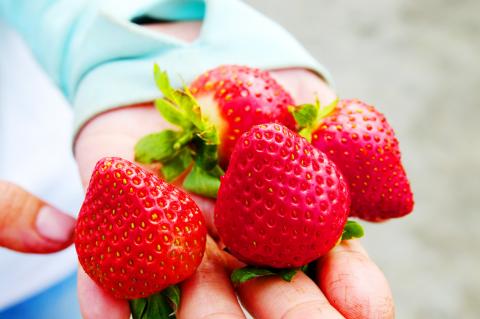Most of the food products sold at convenience stores that claim to contain fresh strawberries instead contain food additives and not the actual fruit, an investigative report by the Chinese-language Liberty Times (sister newspaper of the Taipei Times) has found.
Capitalizing on the strawberry season, which lasts from December to April, many convenience stores and food producers have launched products that purportedly contain fresh strawberries.
Of the nation’s four major convenience store chain operators, President Chain Store Corp’s (統一超商) 7-Eleven and Taiwan FamilyMart Co (全家便利商店) each sell about 40 products claiming to contain strawberries.

Photo: Liu Hsiao-hsin, Taipei Times
However, none of the products sold at 7-Eleven stores and only two at Taiwan FamilyMart stores actually contained strawberries, while of the 18 strawberry food products sold at Pxmart (全聯實業), only half contained the fruit, the report found.
The products’ ingredients include food additives such as spices, food coloring, thickeners and sweeteners, in addition to other common ingredients, while ingredients related to strawberries are actually derivatives of the fruit, such as syrup, jam or powdered strawberries, it said.
7-Eleven on Friday said that its strawberry products clearly list their ingredients on their labels, adding that none of them contravene the regulations.
Taiwan FamilyMart said that it is normal practice to promote products that are in season and consumers are free to purchase products according to their needs.
Pxmart said that all of its strawberry products contain strawberries, adding that while the fruit might be processed into different forms, its strawberry products are all authentic.
The Executive Yuan’s Department of Consumer Protection Officer Wang Te-ming (王德明) said that labels should be clear, as consumers have the right to know what the products contain.
Consumer Protection Foundation chairman Yu Kai-hsiung (游開雄) said products promoting seasonal fruits should include the fruit, adding that the foundation has long criticized a discrepancy between product names and their contents.
Food additives do not have a serious effect on health, doctors said, but drew attention to the overconsumption of sugar, fats and starch.
The nation’s food labeling regulations are strict, said Chiang Chih-kang (姜至剛), a doctor at National Taiwan University Hospital, adding that as long as the food industry follows the regulations, the public need not worry about acute poisoning or bodily harm.
The consumption of sugar is the main issue, Taiwan Adventist Hospital nutritionist Liu Yi-li (劉怡里) said, as its overconsumption could lead to obesity, a high percentage of body fat, high levels of triglyceride or metabolic syndromes.
Children are likely consume more processed food than vegetables and fruits, National Taiwan University’s Institute of Food Science and Technology professor Sheen Lee-yan (沈立言) said, adding that parents should feed their children more fruits and teach them the difference between natural and processed food.

Right-wing political scientist Laura Fernandez on Sunday won Costa Rica’s presidential election by a landslide, after promising to crack down on rising violence linked to the cocaine trade. Fernandez’s nearest rival, economist Alvaro Ramos, conceded defeat as results showed the ruling party far exceeding the threshold of 40 percent needed to avoid a runoff. With 94 percent of polling stations counted, the political heir of outgoing Costa Rican President Rodrigo Chaves had captured 48.3 percent of the vote compared with Ramos’ 33.4 percent, the Supreme Electoral Tribunal said. As soon as the first results were announced, members of Fernandez’s Sovereign People’s Party

EMERGING FIELDS: The Chinese president said that the two countries would explore cooperation in green technology, the digital economy and artificial intelligence Chinese President Xi Jinping (習近平) yesterday called for an “equal and orderly multipolar world” in the face of “unilateral bullying,” in an apparent jab at the US. Xi was speaking during talks in Beijing with Uruguayan President Yamandu Orsi, the first South American leader to visit China since US special forces captured then-Venezuelan president Nicolas Maduro last month — an operation that Beijing condemned as a violation of sovereignty. Orsi follows a slew of leaders to have visited China seeking to boost ties with the world’s second-largest economy to hedge against US President Donald Trump’s increasingly unpredictable administration. “The international situation is fraught

MORE RESPONSIBILITY: Draftees would be expected to fight alongside professional soldiers, likely requiring the transformation of some training brigades into combat units The armed forces are to start incorporating new conscripts into combined arms brigades this year to enhance combat readiness, the Executive Yuan’s latest policy report said. The new policy would affect Taiwanese men entering the military for their compulsory service, which was extended to one year under reforms by then-president Tsai Ing-wen (蔡英文) in 2022. The conscripts would be trained to operate machine guns, uncrewed aerial vehicles, anti-tank guided missile launchers and Stinger air defense systems, the report said, adding that the basic training would be lengthened to eight weeks. After basic training, conscripts would be sorted into infantry battalions that would take

GROWING AMBITIONS: The scale and tempo of the operations show that the Strait has become the core theater for China to expand its security interests, the report said Chinese military aircraft incursions around Taiwan have surged nearly 15-fold over the past five years, according to a report released yesterday by the Democratic Progressive Party’s (DPP) Department of China Affairs. Sorties in the Taiwan Strait were previously irregular, totaling 380 in 2020, but have since evolved into routine operations, the report showed. “This demonstrates that the Taiwan Strait has become both the starting point and testing ground for Beijing’s expansionist ambitions,” it said. Driven by military expansionism, China is systematically pursuing actions aimed at altering the regional “status quo,” the department said, adding that Taiwan represents the most critical link in China’s